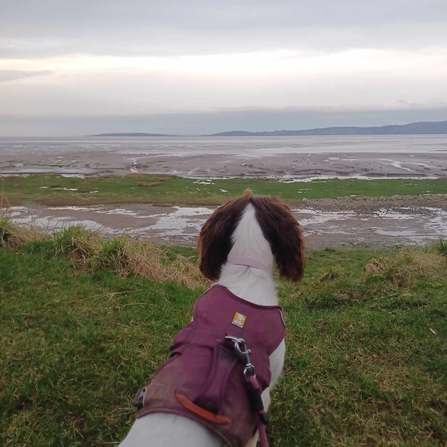
Image by Megan Dobson.

Image by Megan Dobson.
Springtime brings with it the arrival of many migratory species, who travel thousands of miles to nest on nature reserves across the country and are vulnerable to disturbance between February and August.
Keeping dogs close by will help ensure that ground-nesting birds such as skylarks, lapwings, and nightjars are not harmed during the breeding season. Unsupervised dogs can cause birds to abandon their nests, so it’s vital that they are kept under control.
Interactions between people and nature at this time of year can have long-lasting effects and a significant impact on the breeding success and survival rates of the birds.
Many dog owners are passionate about nature and want to avoid harming it. However, even the most well-behaved dogs can unintentionally cause distress or damage wildlife, simply by following their natural curiosity.
Birds perceive dogs as predators and when dogs roam freely, birds may abandon their nests, leaving eggs and chicks cold and unprotected.
In this region, Northumberland Wildlife Trust has raised concerns over the years about dogs chasing birds at its Annstead Dunes reserve, south of Seahouses in Northumberland. Breeding birds on the site include reed bunting, meadow pipits, and stonechats.
Elsewhere, on its Weetslade Country Park reserve on the outskirts of Newcastle, the Trust’s estates team had to install locked gates on part of the site to allow its resident skylarks to breed without disturbance from dogs and humans. During the non-breeding season, the gates are opened for dog walkers to pass through.
It’s not just birds that affected by dogs. Across the region, they have chased and attacked the Trust’s Flexigraze conservation project’s sheep and Exmoor ponies on several of its reserves including East Chevington and Holywell Pond, not to mention seals resting on the beaches at its Cresswell and Annstead Dunes reserves.
Duncan Hutt, dog owner and Director of Conservation at Northumberland Wildlife Trusts, says:
“There's nothing I enjoy more than taking my dog out on a walk in the country and letting him explore like her ancestors. But whether visiting a reserve, or out in nature more generally, I know how important his lead is. Whether there’s livestock, horse-riders, waterfowl, ground-nesting birds, seal pups and small mammals such as mice, weasels, stoats, rabbits, and hares - the lead is essential for every responsible nature-loving dog owner.
“Like me, he loves exploring and taking in the sight and sounds of nature but I'm aware wildlife is suffering severe declines in the UK, and dogs in wild places can cause problems, especially from February through to the end of summer when many species are breeding.
“So, let's all ‘paws for thought’ and try to do our bit in helping to protect nature whilst out with our beloved four-legged friends.”
Dr Jenna Kiddie, Head of Canine Behaviour at Dogs Trust, says:
“Dogs enrich our lives, but they also bring a level of responsibility. Whilst many of us enjoy taking our dogs for long walks, especially as it becomes a bit warmer, we urge dog owners to consider their surroundings, particularly when visiting areas where they might encounter wildlife.
“When visiting rural areas, owners should keep their dogs under control and ensure they do not worry other animals or stray from the path, as well as dispose of their dog's waste appropriately. We would advise keeping your dog on a short lead, and close to you, especially whenever livestock are nearby. It is important to remember that chasing is normal dog behaviour, and that any dog is capable of chasing, irrelevant of breed, type, age, or size. We would encourage owners to explore training options such as the Dogs Trust’s Dog School.”
From designated walking paths to understanding the changing wildlife seasons, Northumberland Wildlife Trust says there is plenty that people can do to ensure everyone has a safe and enjoyable experience at its reserves… on two legs or four.
Visit www.wildlifetrusts.org/dogs-and-nature for more information about responsible dog walking.